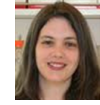Biology for Citizens of the World
From Megan Rokop
 This past semester, I was offered my dream career task. I was given free reign, as the new Associate Director of the Honors College at UMass Boston, to teach two college biology classes – capped at 20 students each – in any way or format that I wanted. This past semester, I was offered my dream career task. I was given free reign, as the new Associate Director of the Honors College at UMass Boston, to teach two college biology classes – capped at 20 students each – in any way or format that I wanted.
Upon receiving this assignment, I kept asking questions out of sheer disbelief: “But presumably I have to use a textbook?” or “Presumably I still have to give exams?” Each time I asked a question about needing to include a component that is assumed of an introductory level college biology class, the answer was always “no.” Slowly I came to accept the cold hard truth – I was about to embark on my dream career task.
Below is a summary of what one person (namely, me) ended up doing, when given the opportunity to teach biology outside of the confines of textbooks, exams, standards, standardized tests, pre-requisite courses, and many other similar stipulations.
Before I begin, I should say that it did occur to me that those of you who have many such stipulations in your current role might wonder why you should read any further. During my years teaching biology in high school and university classrooms, I have found that very rewarding parts of my job often came from those times when I was able to “squeeze something in” that I really felt the students would enjoy or benefit from – even when I knew it wouldn’t help them on the MCAS, the MCAT, or any other acronym in which they may one day partake.
My hope with this article is that – if you do see something you might like to “squeeze in” to what I can only imagine is already a jam-packed curriculum – you won’t hesitate to contact me, as I am always more than happy to share my curricular materials. (And if you have lessons or ideas you would like to share with me, I would love to hear from you about those, as well!) With all this in mind, I invite you to read the following brief account of my experiences teaching biology without stipulations.
In the Spring 2014 semester, I designed and taught two courses for the UMass Boston Honors College. I named my freshman course (taken by 20 science majors) “Doing Science and Being a Scientist.” The premise I chose for this course was to teach the skills these students would need to be scientists – not later on in their training, but from the very beginning of their career paths. I named my upperclassman course (for 20 non-majors) “Biology for Citizens of the World.” In this class, I strove to focus exclusively on topics I felt that anyone might need to know in their daily lives (regardless of their future career decisions), because one day, each of these students would fall ill, would vote in an election, and would be called to sit on a jury.
Each course included two or three longer 1500-word writing assignments, such as:
- Writing a paper on one’s own stance relating to a current bioethical issue
- Reading a biography of a famous scientist, and writing a paper about how that person’s personality and life events impacted his/her career decisions and approach to science
- Accumulating data throughout the semester on an aspect of your daily life (e.g. the time you left the house each day, and the time your commute took), and writing a scientific paper (including multiple data figures) describing your findings
Each course also had weekly 300-word written assignments. In the non-majors course, these were problem solving-based questions, aimed to train them to think like a scientist about designing experiments and interpreting data. In the course for science majors, examples of the shorter assignments included:
- Interviewing someone with a science career and reflecting on the interview
- Writing a scientific review of a journal article that had won the IgNobel Prize
- Drafting a reading assignment intended for a 6th grade science class (to practice the art of writing science for young audiences)
The reading assignments for each class period were 1 or 2 short news articles on the day’s topic, taken from newspapers, popular science magazines, and the “news” or “policy” sections of scientific journals.
During class time, we would engage in small-group discussions, large-group discussions, or hands-on activities about a range of topics, including:
- Bioethical issues, such as: DNA testing, DNA crime banks, GMOs, gene therapy, clinical trials and informed consent
- Common complex human conditions, such as: diabetes, depression, and schizophrenia
- Global public health issues, such as: HIV, TB, and malaria
- Scientific skills, such as: writing a scientific paper, the concepts (without formulas) behind various statistical tests, and interpreting the p-values these tests yield
If you would like to chat more about any of the readings, in-class activities, or assignments I used in these classes, feel free to contact me at <rokop@alum.mit.edu>. I am also more than happy to share the compiled results of the anonymous student evaluations from these courses, if you would like. And before signing off, I want to wish you all the best as we all embark upon the new school year!
Megan Rokop is the Associate Director of the Honors College at UMass Boston, and is trained as a microbial geneticist.
Back to newsletter |